Tata Group
Tata Group (/ˈtɑːtɑː/) is an Indian multinational conglomerate holding company headquartered in Mumbai, Maharashtra, India. Founded in 1868 by Jamsetji Tata, the company gained international recognition after purchasing several global companies. One of India's largest conglomerates, Tata Group is owned by Tata Sons.[3][4] It is one of the biggest and oldest industrial groups in the country, founded 153 years ago in 1868. Each Tata company operates independently under the guidance and supervision of its own board of directors and shareholders.
 | |
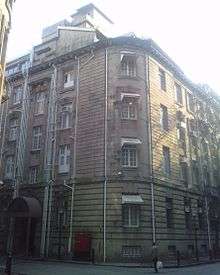 Tata Group's headquarters, the Bombay House | |
| Private | |
| Industry | Conglomerate |
| Founded | 1868 |
| Founder | Jamsetji Tata |
| Headquarters | Bombay House, Mumbai, Maharashtra, India |
Area served | Worldwide |
Key people | Natarajan Chandrasekaran (chairman)[1] |
| Products |
|
| Revenue | |
| Owner | Tata Sons |
Number of employees | 722,281 (2019)[2] |
| Subsidiaries | List of subsidiaries |
| Website | www |
Significant Tata companies and subsidiaries include Tata Chemicals, Tata Communications, Tata Consultancy Services, Tata Consumer Products, Tata Elxsi, Tata Motors, Tata Power, Tata Steel, Voltas, Tata Cliq, Titan, Trent (Westside), Indian Hotels Company Limited, TajAir, TATA AutoComp systems Ltd, Vistara, Cromā and Indicash.
History
1868–1904
At the age of 29, Jamsetji Tata worked in his father's company. In 1870 with Rs.21,000 capital, he founded a trading company. Further he bought a bankrupt oil mill at Chinchpokli and converted it into a cotton mill, under the name Alexandra Mill which he sold for a profit after 2 years. In 1874, he set up another cotton mill at Nagpur named Empress Mill. He dreamed of achieving 4 goals, setting up an iron and steel company, a unique hotel, a world-class learning institution and a hydro-electric plant. During his lifetime, in 1903, the Taj Mahal Hotel at Colaba waterfront was opened making it the first hotel with electricity in India.
1904–1938
After Jamsetji's death, his older son Dorabji Tata became the chairman in 1904. Sir Dorabji established the Tata Iron and Steel company (TISCO), now known as Tata Steel in 1907. Marking the group's global ambitions, Tata Limited opened its first overseas office in London. Following the founder's goals, Western India's first hydro plant was brought to life, giving birth to Tata Power. Yet another dream, Indian Institute of Science was established with the first batch admitted in 1911.
1938–1991
JRD Tata was made chairman of the Tata Group in 1938. Under his chairmanship, the assets of the Tata Group grew from US$101 million to over US$5 billion. Starting with 14 enterprises, upon his departure half a century later in 1988, Tata Sons had grown to a conglomerate of 95 enterprises. These enterprises consisted of ventures that the company had either started or in which they held controlling interest. New sectors such as chemicals, technology, cosmetics, marketing, engineering, and manufacturing, tea, and software services earned them recognition.[5]
In 1952, JRD founded an airline, known as Tata Air Services (later renamed Tata Airlines). In 1953, the Government of India passed the Air Corporations Act and purchased a majority stake in the carrier from Tata Sons, though JRD Tata would continue as chairman till 1977.
In 1945, Tata Motors was founded, first focused on locomotives. In 1954, it entered the commercial vehicle market after forming a joint venture with Daimler-Benz. In 1968, Tata Consultancy Services was founded.
1991–present
In 1991, Ratan Tata became chairman of Tata Group.[6] This was also the year of economic liberalization in India, opening up the market to foreign competitors.[7] During this time, Tata Group began to acquire a number of companies, including Tetley (2000), Corus Group (2007), and Jaguar and Land Rover (2008). In 2017, Natarajan Chandrasekaran was appointed chairman.
Chairman
The chairman of Tata Sons is usually the chairman of the Tata Group. As of 2020, there have been eight chairmen of Tata Group.
- Jamsetji Tata (1868–1904)
- Sir Dorab Tata (1904–1932)
- Nowroji Saklatwala (1932–1938)
- JRD Tata (1938–1991)
- Ratan Tata (1991–2012)
- Cyrus Mistry (2012–2016)
- Ratan Tata(2016–2017)
- Natarajan Chandrasekaran (2017-present)[8]
Subsidiaries
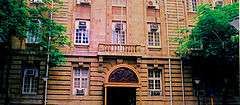
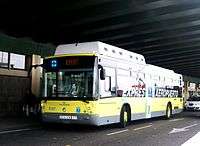
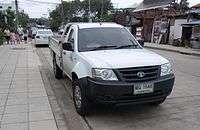
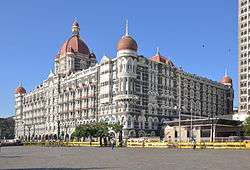
Tata Group of Companies has many subsidiaries. These subsidiaries function in almost all sectors. This section lists the Tata companies and details their business:
Chemicals
- Advinus Therapeutics
- Brunner Mond
- General Chemical Industrial Products
- Magadi Soda Company
- Rallis India
- Tata Pigments Limited
Consumer products
- Casa Décor
- Infiniti Retail (Cromā)
- Landmark Bookstores
- Tata Ceramics
- Tata Consumer Products, second-largest global manufacturer of tea.
- Tata Salt
- Tata Sampann
- Himalayan, mineral water brand
- I-shakti
- Tata Tea
- Tata Coffee
- Tata Starbucks, a 50:50 joint venture company, owned by Starbucks Corporation and Tata Consumer Products
- Tata Industries
- Tata International Ltd.
- Tata Refractories
- Tata Chemicals
- Tata Zoya
- Titan Industries
- Voltas, consumer electronics company
- Westside
E-commerce
- Tata Cliq as an E-commerce platform
- Tata cliq luxury as a shopping of luxury brands
- Starquik as an online grocery store by Tata Enterprise
Energy
- Hooghly Met Coke and Power Company
- Jamshedpur Utilities and Services Company
- Powerlinks Transmission
- Tata Petrodyne
- Tata Power, one of the largest private sector power companies
- Tata Power Delhi Distribution Ltd (formerly known as North Delhi Power Ltd)
- Tata Power Solar, started as a joint venture between Tata Power and BP Solar, now a wholly owned company
- Tata Power Trading
- Tata Projects
Engineering
- TAL Manufacturing Solutions
- Tata Advanced Systems Limited
- Tata Advanced Materials
- Tata AutoComp Systems Limited (TACO)
- Tata Consulting Engineers Limited
- Tata Cummins
- Tata Motors, India's largest manufacturer of commercial vehicles and passenger cars; parent company of:
- Hispano Carrocera
- Jaguar Land Rover (manufacturing cars under the Jaguar and Land Rover marques)
- Tata Daewoo Commercial Vehicle
- Tata Marcopolo
- Tata Motors European Technical Centre
- Tata Petrodyne
- Tata Precision Industries
- Tata Projects
- Telco Construction Equipment
- TRF
- Voltas Global Engineering Centre
- TitanX
Information systems and communications
- Nelco Ltd. (national radio and electronics company)
- Nelito Systems - Started as an IT JV of Nelco and Itochu, DTS of Japan bought the company
- Tata Business Support Services
- Tata Communications
- Tata Consultancy Services Ltd. (TCS), one of world's largest IT services companies
- CMC Limited
- Computational Research Laboratories
- Tata Elxsi
- Tata Interactive Systems
- Tata Technologies Limited
- Tata Teleservices
- Tata Sky
- Tata DoCoMo
- Tatanet, managed connectivity and VSAT service provider
Services
- Drive India Enterprise Solutions
- Mjunction
- Tata Advanced Systems Limited
- Tata AutoComp Systems
- Tata Interactive Systems
- Tata NYK
Airlines
- Air Asia India joint venture with Air Asia
- Vistara joint venture with Singapore Airlines
Catering
- Bombay Brasserie
- Golden Dragon
- Wassabi
- Thai Pavilion
- House of Ming
Hotels
- The Indian Hotels Company
- amã Stays & Trails
- SeleQtions
- Roots Corporation
- Taj Hotels
- Vivanta By Taj
- TajAir
- Taj Holidays
- The Gateway Hotels & Resorts
Financial services
- Indicash ATM (India's first and largest white-label ATM network)
- e-Nxt Financials Ltd.
- TATA AIA Life Insurance
- TATA AIG General Insurance
- Tata Asset Management
- Tata Capital
- Tata Communications Payment Solutions (banking and financial services)
- Tata Financial Services
Holding companies
- Tata Africa Holdings
- Tata AG]
- Tata International AG
- Tata Investment Corp
- Tata Limited
Realty
- Tata Housing Development Company Ltd. (THDC)
- Tata Realty and Infrastructure Limited
Organisational services
- Tata Industrial Services
- Tata Quality Management Services
- Tata Services
- Tata Strategic Management Group
Logistics
- TKM Global, Logistics and Supply Chain
Iron and steel
- JAMIPOL
- NatSteel Holdings
- Tata Bearings
- Tata Steel
- Tata BlueScope Steel
- Tata Metaliks
- Tayo Rolls
- Tata Sponge Iron
- Tata Steel Europe
- Tata Steel KZN
- Tata Steel BSL
- Tata Steel Processing and Distribution
- The Tinplate Company of India
- TM International Logistics
Acquisitions
- February 2000 – Tetley Tea Company, $407 million[9]
- March 2004 – Daewoo Commercial Vehicle Company, $102 million
- August 2004 – NatSteel's Steel business, $292 million
- November 2004 – Tyco Global Network, $130 million
- July 2005 – Teleglobe International Holdings, $239 million
- October 2005 – Good Earth Corporation
- December 2005 – Millennium Steel, Thailand, $165 million
- December 2005 – Brunner Mond Chemicals, $10 million
- June 2006 – Eight O'Clock Coffee, $220 million
- November 2006 – Ritz Carlton Boston, $170 million
- January 2007 – Corus Group, $12 billion[10]
- March 2007 – PT Kaltim Prima Coal (KPC) (Bumi Resources), $1.1 billion
- April 2007 – Campton Place Hotel, San Francisco, $60 million
- January 2008 – Imacid Chemical Company, Morocco[11]
- February 2008 – General Chemical Industrial Products, $1 billion
- March 2008 – Jaguar Cars and Land Rover, $2.3 billion
- March 2008 – Serviplem SA, Spain
- April 2008 – Comoplesa Lebrero SA, Spain
- May 2008 – Piaggio Aero Industries S.p.A., Italy - Sold Off in 2015
- June 2008 – China Enterprise Communications, China
- October 2008 – Miljo Grenland / Innovasjon, Norway
- April 2010 – Hewitt Robins International, United Kingdom
- July 2013 – Alti SA, France
- December 2014 – Energy Products Limited, India
- June 2016 – Welspun Renewables Energy, India
- May 2018 – Bhushan Steel Limited, India
Philanthropy
Tata Group has helped establish and finance numerous research, educational and cultural institutes in India,[12][13] and received the Carnegie Medal of Philanthropy.[14] Some of the institutes established by the Tata Group are:
- Tata Institute of Fundamental Research
- The Energy and Resources Institute (formerly known as Tata Energy and Research Institute), a non-governmental research institute
- The JRD Tata Ecotechnology Centre
- National Centre for Performing Arts
- Tata Center for Technology & Design at Massachusetts Institute of Technology[15]
- Tata Centre for Technology & Design at IIT Bombay[16]
- Tata Cricket Academy
- Tata Football Academy
- Tata Institute of Social Sciences
- Tata Management Training Centre
- Tata Medical Center, inaugurated on 16 May 2011 by Ratan Tata[17]
- Tata Memorial Hospital
- Tata Cancer Hospital
- Tata Trusts, a group of philanthropic organisations run by the head of the business conglomerate Tata Sons
In 2008, Tata Group donated US$50 million to Cornell University for "agricultural and nutrition programs in India and for the education of Indian students at Cornell."[18]
In 2010, Tata Group donated ₹ 2.20 billion (US$50 million) to the Harvard Business School to build an academic and a residential building for executive education programmes on the institute's campus in Boston, Massachusetts.[19] The building, now known as Tata Hall,[20] is the largest endowment received by Harvard Business School from an international donor.[19]
In 2017, Tata Consultancy Services (TCS) donated an unprecedented $35 million grant to Carnegie Mellon University, the largest ever industry donation to the university, to collaborate on promoting next-generation technologies that will drive the Fourth Industrial Revolution, including cognitive systems and autonomous vehicles.[21]
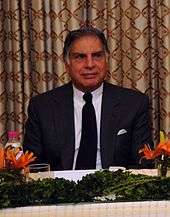
In 2017, the Tata Football Academy won the bid to form the Jamshedpur FC, a football club based on Jamshedpur of Jharkhand in the 4th edition of the Indian Super League.[23]
In 2020, Tata Group has donated 1500 crores to PM Cares Fund to fight against COVID-19 pandemic in India.[24]
Controversies and criticisms
The Tata Group has also attracted some controversy during its more than 150 years in operation, notably:
Munnar, Kerala
The Kerala Government filed an affidavit in the high court alleging that Tata Tea had "grabbed" forest land of 3,000 acres (12 km2) at Munnar. The Tatas provided that they possessed 58,741.82 acres (237.7197 km2) of land, which they are allowed to retain under the Kannan Devan Hill (Resumption of Lands) Act, 1971, and there was a shortage of 278.23 hectares (2.7823 km2) in that. The Chief Minister of Kerala V.S. Achuthanandan, who vowed to evict all on government land in Munnar, formed a special squad for the Munnar land takeover mission and started acquiring back properties. However, the mission was aborted due to both influential land-holders and opposition from Achuthanandan's own party.[25]
Kalinganagar, Orissa
On 2 January 2006, Kalinganagar, Tribal Orissa villagers protested the construction of a new steel plant for Tata Steel on land historically owned by them. Some of the villagers had been evicted without adequate relocation. Police retribution was brutal: 37 protesters were injured and 13 killed, including 3 women and a 13-year-old boy. One policeman was hacked to death by a mob, after police had opened fire on protestors with tear gas and rubber bullets. Family members of the deceased villagers later claimed that the bodies had been mutilated during post-mortem examination.[26]
Supplies to Burma's military regime
In December 2006, Myanmar's chief of general staff, General Thura Shwe Mann, visited the Tata Motors plant in Pune.[27] In 2009, TATA Motors announced that it would manufacture trucks in Myanmar. Tata Motors reported that these contracts to supply hardware and automobiles to Burma's military were subsequently criticised by human rights activists.[28][29]
Singur land acquisition
The Singur controversy[30] in West Bengal was a series of protests by locals and political parties over the forced acquisition, eviction, and inadequate compensation to those farmers displaced for the Tata Nano plant, during which Mamata Banerjee's party was widely criticised as acting for political gain. Despite the support of the Communist Party of India (Marxist) state government, Tata eventually pulled the project out of West Bengal, citing safety concerns. Narendra Modi, then Chief Minister of Gujarat, made land available for the Nano project.[31]
On Aug 31, 2016, in a historic judgement, the Honorable Supreme Court of India set aside the land acquisition by the West Bengal Government in 2006 that had facilitated Tata Motors' Nano plant, stating that the West Bengal government had not taken possession of the land legally, and were now required to repossess and return it to local farmers within 12 weeks without compensation.[32]
Dhamra Port, Odisha
The Port of Dhamara has received significant coverage, sparking controversy in India, and in Tata's emerging global markets.[33] The Dhamra port, an equal joint venture between Tata Steel and Larsen & Toubro, has been criticised for its proximity to the Gahirmatha Sanctuary and Bhitarkanika National Park by Indian and international organisations, including Greenpeace; Gahirmatha Beach is one of the world's largest mass nesting sites for the olive ridley turtle, and India's second largest mangrove forest, Bhitarkanika, is a designated Ramsar site, and critics claimed that the port could disrupt mass nesting at Gahirmtha beaches as well as the ecology of the Bitharkanika mangrove forest.[34][35] TATA Steel employed mitigation measures set by the project's official advisor, the International Union for Conservation of Nature (IUCN), and the company pledging to "adopt all its recommendations without exception" when conservation organisations asserted that a thorough environmental impact analysis had not been done for the project, which had undergone changes in size and specifications since it was first proposed.[36]
Proposed soda extraction plant in Tanzania
In 2007, Tata Group joined forces with a Tanzanian company to build a soda ash extraction plant in Tanzania.[37] Environmental activists oppose the plant because it would be near Lake Natron, and it has a very high chance of affecting the lake's ecosystem and its neighbouring dwellers,[38] jeopardising endangered lesser flamingo birds. Lake Natron is where two-thirds of lesser flamingos reproduce.[39] Producing soda ash involves drawing out salt water from the lake, and then disposing the water back to the lake. This process could interrupt the chemical makeup of the lake.[37] 22 African nations signed a petition to stop its construction.[37]
Epic Systems trade-secret case judgement
In April 2016, a U.S. Federal Grand Jury awarded Epic Systems a $940 million judgement against Tata Consultancy Services and Tata America International Corp. Filed 31 October 2014; the suit charged that "6,477 unauthorized downloads could be used to enhance Tata's competing product, Med Mantra."[40][41][42] In 2017, U.S. District Court Judge William Conley reduced the Award to $420 million; the company states that the judgement is also being appealed, as "not supported by evidence presented during the trial and a strong appeal can be made to superior court to fully set aside the jury verdict.”[43]
2018 NCLT verdict
In July 2018, the National Company Law Tribunal (NCLT), which "adjudicates issues relating to Indian companies,"[44] issued a verdict in the company's favor on charges of mismanagement leveled in 2016 by ousted chairman, Cyrus Mistry.[45]
See also
- List of companies of India
- List of largest companies by revenue
- List of corporations by market capitalization
- Make in India
- Forbes Global 2000
- Fortune India 500
- Pallonji Mistry
- Noel Tata
- Sir Dorabji Tata and Allied Trusts
References
- "Supreme Court stays NCLAT order restoring Cyrus Mistry as Tata Sons Executive Chairman". ET News. 11 January 2020. Retrieved 14 January 2020.
- "Tata Group Business Overview". Tata Group.
- Pocha, Jehangir (12 December 2011). Tata Sons: Passing the Baton. Forbes India. Retrieved 25 September 2017.
- "Tata Sons Limited vs The Deputy Cit, Special Range-1 on 28 April, 2006". www.indiankanoon.org. Civil court, Mumbai. Retrieved 25 September 2017.
- "Tata Group | History, Companies, Subsidiaries, & Facts". Encyclopedia Britannica. Retrieved 20 March 2020.
- "Here's a brief history of the Tata Group's six chairmen". www.businesstoday.in. Retrieved 31 July 2020.
- "One more push". The Economist. ISSN 0013-0613. Retrieved 31 July 2020.
- "Supreme Court Stays NCLAT order restoring Cyrus Mistry as Chairman". 11 January 2020 – via The Economic Times.
- "Tatas' shopping spree: 27 in 6 years!". Rediff. 24 August 2006. Retrieved 15 August 2015.
- "Tata Steel gives India a pound of UK". timesofindia-economictimes. Retrieved 15 August 2015.
- Timmons, Heather (4 January 2008). "Tata Pulls Ford Units into Its Orbit". The New York Times. Retrieved 21 June 2009.
- "The rainbow effect". 4 May 2008.
- "India's Tata Group: Empowering marginalized communities". 4 May 2008.
- "U.S. and Indian philanthropists recognized for conviction, courage and sustained efforts". 4 May 2008. Archived from the original on 26 September 2008.
- "MIT Tata Center: MIT Tata Center". tatacenter.mit.edu.
- "Tata Centre for Technology & Design at IIT Bombay".
- "Tata Medical Center". Retrieved 15 August 2015.
- "$50 million endowment from Tata trust bolsters Cornell ties to India, and to eminent alumnus". Cornell. USA. 17 October 2008. Retrieved 11 June 2018.
- Singh, D. K. (9 April 2018). "Tata Trusts accused of favouring Harvard over 'under-privileged' Indian universities". ThePrint. Retrieved 31 July 2020.
- "Tatas gift Rs220 crore to Harvard Business School – Mumbai – DNA". Dnaindia.com. 16 October 2010. Retrieved 2 February 2011.
- "Carnegie Mellon and Tata Consultancy Services Break Ground on Global Research Facility in the U.S." Carnegie Mellon University.
- "Cyrus Mistry Replaced by Ratan Tata as Tata Sons chairman – The Economic Times". The Economic Times. Retrieved 27 October 2016.
- "Why Indian Super League got the Tata Group to review its football investment". Hindustan Times. 13 November 2017. Retrieved 31 July 2020.
- Pathak, Kalpana (28 March 2020). "Tata Group commits ₹1,500 crore to fight Covid-19". Livemint. Retrieved 2 July 2020.
- "Tata Group refutes charge of encroachment in Munnar". HT Media Limited. Hindu Times. 15 July 2017. Retrieved 25 October 2018.
- Nityanand Jayaraman (24 May 2006). "CorpWatch : Stolen for Steel: Tata Takes Tribal Lands in India". Corpwatch.org. Retrieved 16 July 2010.
- "Myanmar Ties." 8 December 2006. The Telegraph, Calcutta, India.
- "India's Independent Weekly News Magazine". Tehelka. Retrieved 16 July 2010.
- "Ansari visits Myanmar tomorrow, 3 MoUs to be signed". Zeenews.com. 4 February 2009. Retrieved 16 July 2010.
- "Singur farmers: Why they oppose Tata plant". Retrieved 15 August 2015.
- "Singur's loss". Hinduonnet.com. 7 November 2008. Retrieved 2 February 2011.
- "Singur verdict announced, SC says return land to farmers: Here's a timeline of the case – Firstpost". Firstpost. 31 August 2016. Retrieved 25 October 2016.
- "India – Tata in troubled waters – Ethical Corporation". Ethicalcorp.com. November 2007. Retrieved 16 July 2010.
- "Documents And Reports | Save the turtles". Greenpeace.in. 12 June 2009. Retrieved 16 July 2010.
- "Sea dredging affecting Olive Ridley turtles, says green body". Thaindian.com. 5 April 2008. Retrieved 16 July 2010.
- Tata Steel "Corporate Citizenship Report 2010/2011", TataSteel.com, 2011, page 20. Retrieved October 24, 2018.
- "Dar annoys neighbours over $400m soda ash project". The East African. Nation Media Group. 5 November 2007. Retrieved 21 June 2009.
- Magubira, Patty (16 May 2008). "Tanzania: UK Activists Pile Pressure Against Soda Ash Project". The Citizen. Dar es Salaam: AllAfrica.com. Retrieved 21 June 2009.
- Pathak, Maulik (31 October 2007). "Tata Chemicals' African safari hits green hurdle". The Economic Times. India. Retrieved 21 June 2009.
- "US jury slaps $940 million fine on Tata group in trade secret case". The Times of India. 16 April 2016. Archived from the original on 16 April 2016. Retrieved 16 April 2016.
- Judy Newman (5 April 2016). "Jury trial begins in Epic Systems Corp. lawsuit against India's Tata Consultancy". Wisconsin State Journal. Archived from the original on 16 April 2016. Retrieved 16 April 2016.
- Kyle Murphy, PhD (11 April 2016). "Epic Systems Taking TCS to Court over Theft of Trade Secrets". EHR Intelligence. Archived from the original on 16 April 2016. Retrieved 16 April 2016.
- Wahlberg, David "Award to Epic in trade secrets case reduced from $940 million to $420 million", Wisconsin State Journal, October 4, 2017. Retrieved July 12, 2018.
- "National Company Law Tribunal constituted – new perspectives for dispute resolution". Khaitan & Co. Retrieved 13 June 2016.
- "Ratan Tata welcomes NCLT verdict". The Economic Times. 9 July 2018. Retrieved 12 June 2018.
External links
- Official website
- Tata Group collected news and commentary at BloombergQuint